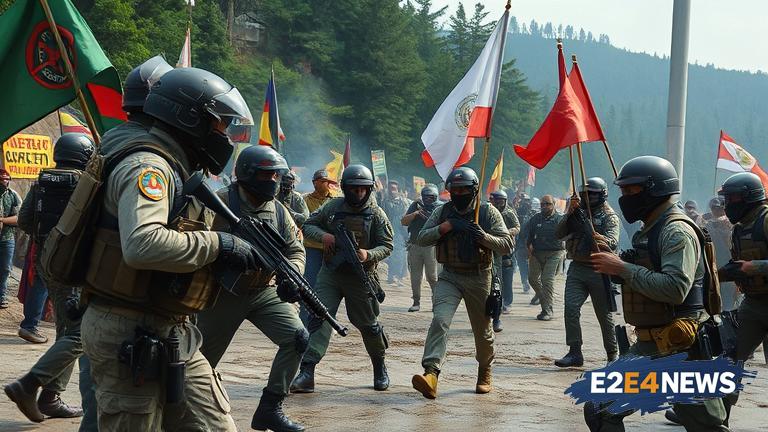A confrontation between protesters and special forces in the town of Tskaltubo, Georgia, has left two people injured. The clash occurred as special forces attempted to arrest a protester opposing the construction of a hydropower plant in the area. The protester, who was not named, was reportedly resisting arrest, leading to a scuffle between the two parties. The special forces used tear gas and rubber bullets to disperse the crowd, resulting in two injuries. The injured individuals were taken to a local hospital for treatment. The protests against the hydropower project have been ongoing for several weeks, with locals expressing concerns about the potential environmental impact of the project. The project, which is being developed by a private company, aims to generate electricity by harnessing the power of a nearby river. However, protesters argue that the project will harm the local ecosystem and disrupt the natural flow of the river. The Georgian government has stated that the project will provide much-needed electricity to the region and create jobs. Despite this, protesters remain unconvinced, citing concerns about the project’s potential impact on the environment. The use of special forces to quell the protests has been criticized by human rights groups, who argue that the government is using excessive force to silence dissenting voices. The Georgian government has defended its actions, stating that the special forces were necessary to maintain order and prevent the protests from turning violent. The incident has sparked widespread condemnation, with many calling for the government to reconsider its plans for the hydropower project. The protests are likely to continue, with locals vowing to fight against the project until their concerns are heard. The Georgian government faces a difficult decision, balancing the need for economic development with the need to protect the environment and respect the rights of its citizens. The international community is watching the situation closely, with many expressing concern about the potential human rights implications of the government’s actions. The incident has also sparked a wider debate about the role of special forces in maintaining order and the limits of government power. As the situation continues to unfold, it remains to be seen how the government will respond to the protests and whether the project will ultimately be completed. The fate of the hydropower project and the future of the region hang in the balance, as the government and protesters engage in a bitter standoff. The use of force to quell the protests has raised questions about the government’s commitment to democracy and human rights. The incident has also highlighted the need for greater transparency and accountability in government decision-making. The Georgian government must now navigate a complex web of competing interests and priorities, as it seeks to balance the needs of its citizens with the need to promote economic development. The protests against the hydropower project are a symptom of a deeper issue, one that highlights the need for greater public participation in decision-making and a more nuanced approach to economic development. As the situation continues to evolve, it is clear that the Georgian government faces a significant challenge in addressing the concerns of its citizens and promoting sustainable development.





